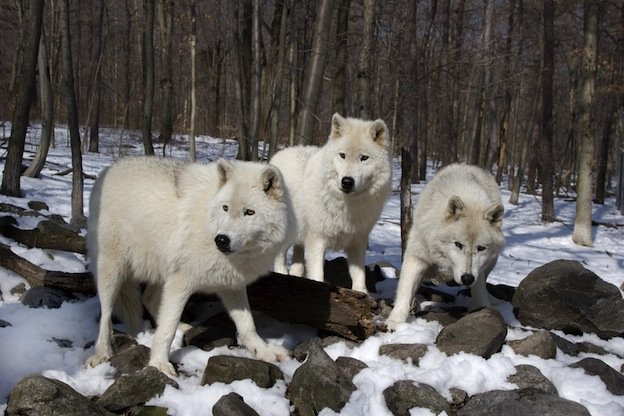The Arctic wolf also known as the Melville Island wolf, is a subspecies of gray wolf native to the Canadian Arctic Archipelago, from Melville Island to Ellesmere Island. No other wolf in the world can offer the same coloring as the Arctic Wolf. It is very unique due to the location where it is found. While some species of wolves do have some white coloring, this one is almost completely white. They do offer some aspects of yellow, gray, and black in places though. It is a medium-sized subspecies, distinguished from the northwestern wolf by its smaller size, its whiter coloration, its narrower brain-case,and larger carnassials.



.jpg)
Due to the extreme cold where the Arctic Wolf lives, they have two thick layers of fur. The outer layer actually gets thicker as the winter months come along. They first layer helps to form a waterproof barrier for the skin. As a result their body temperature can stay warm enough even when it is bitter cold.
These wolves also have smaller ears than other species. That is part of them staying warm as well. They also help them to regular their overall body temperature. Since the ground is permanently frozen they have padded paws that are designed to offer them a good grip when they walk.
.jpg)
The Arctic wolf is relatively unafraid of people, and can be coaxed to approach people in some areas. It has occasionally acted aggressively toward humans. Otto Sverdrup wrote that during the Fram expedition, a pair of wolves attacked one of his teammates, who defended himself with a skiing pole.] In 1977, a pair of scientists were approached by six wolves on Ellesmere Island, with one animal leaping at one of the scientists and grazing a cheek. A number of incidents involving aggressive wolves have occurred in Alert, Nunavut, where the wolves have lived in close proximity to the local weather station for decades and became habituated to humans.
Some people believe that the Arctic Wolf is a loner by nature but that isn’t true. Those that are seen alone may be away from their pack to search for food. They can also be on their own looking to make their own pack. The size of these groups can be from just a couple of wolves to about twenty. Generally the size of the pack will depend on how much food happens to be available to them.
These wolves happen to be very territorial. However, most of them do have hundreds of miles that they can cover within their home range. As a result of this they don’t really mind so much when other packs have a territory that overlaps. They do heavily mark their territory though with urine and their own scent.
Due to the location of the Arctic Wolf, they are very limited when it comes to the supply of food they can consume. Generally they will eat caribou and muskoxen. Since these animals are much larger than they are, it is a group effort to successfully take one down. Even though they are great hunters, their prey can often get away before they can attack from all sides.
When they do make contact though they will be successful. Arctic Wolves have very sharp teeth as well as powerful jaws. They are able to rip into the flesh and crunch the bones of the animals they capture. They can eat more than 20 pounds of meat at a time. They often know that it may be a while before their next meal so they will consume all that they possibly can when it is readily available to them.
Due to the freezing cold, a large animal that they kill may offer enough food for the entire wolf pack for several days. When that is the case they will take turns feeding and also protecting the kill from other animals. There are other times though when they must go for weeks without much food at all. It may also be necessary for them to move according to the movements of their prey. Otherwise the risk of not finding a meal soon enough becomes reality.
For the young pups that are outside of the mother’s den but aren’t old enough to hunt yet, they still need meat. In order to get it, the other members of the pack will offer them regurgitated meat that they have partially consumed.
.jpg) !
!
Thanks to @sirknight for this opportunity.
Reference: Google,Wikipedia and http://www.wolfworlds.com/arctic-wolf/
Hi! I am a robot. I just upvoted you! I found similar content that readers might be interested in:
http://www.wolfworlds.com/arctic-wolf/
yes some contents where gotten from http://www.wolfworlds.com/arctic-wolf/